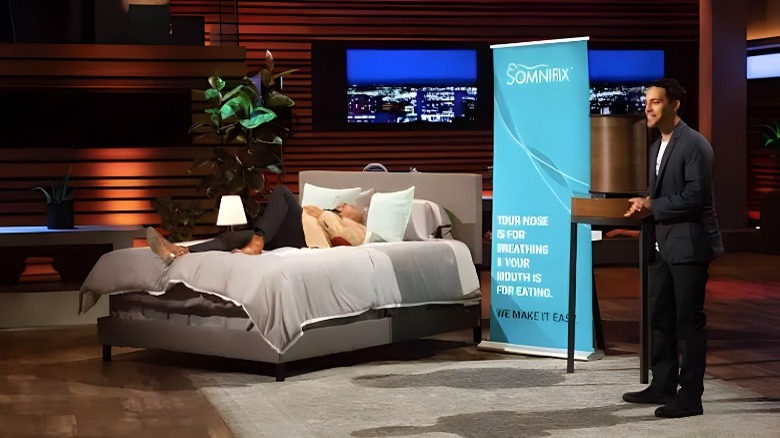Where Is SomniFix From Shark Tank Season 10 Today?
Dr. Andre Michalak developed SomniFix mouth strips when he started snoring as a symptom of sleep apnea. SomniFix is a small piece of tape that goes over your mouth to encourage breathing through your nose. There's a small vent in the middle for a little mouth breathing. The product says that nose breathing can improve your sleep quality, reduce snoring, and make your CPAP machine more effective.
The Sleep Foundation says the single-use, recyclable SomniFix strips can replace the older method of training to breathe through the nose by placing a piece of tape over the mouth. SomniFix is easier (and less painful) to remove than older mouth taping methods. Although SomniFix is safe for most people, it shouldn't be used by people who have low blood pressure, a cold or sinus infection, or a body mass index (BMI) over 35. It's also not recommended for children or people who've had alcohol or sedatives.
Fans of "Shark Tank" may be familiar with SomniFix, as its creators tried to get the Sharks on board with it during a season 10 episode. If you're curious about what has happened to the product since then, read on.
The Shark Tank pitch
According to the official "Shark Tank" blog, Michalak and his son Nicholas invested $1.4 million to conduct clinical studies on the product, and it made just $350,000 in sales before Nicholas took the product to "Shark Tank" for some help.
During season 10 of Shark Tank, Nicholas started his pitch by talking about the importance of quality sleep and how breathing through your mouth can interfere with sleep. He invited Daymond John to try the product, then asked the Sharks to invest $500,000 for a 10% stake in the business. John said the product was good, but not good enough to invest in, and Lori Greiner didn't believe the market would respond well to the product. Barbara Corcoran said she was concerned about SomniFix's viability, because Michalak spent "twice as much money than [he] needed to get this off the ground" (via CNBC). Kevin O'Leary also declined.
Mark Cuban was impressed that Michalak invested in clinical studies on SomniFix before bringing the product to market. Cuban said he thought SomniFix could be good for sports performance, so he said he'd invest $500,000 for a 20% stake in SomniFix. Michalak countered for a $2 million post-money valuation. Even though Cuban agreed to the deal on Shark Tank, he never finalized the deal (via Shark Tank Recap).
SomniFix is still available
You can still buy SomniFix on its website, where it's garnered almost 5,000 (mostly 5-star) reviews. People who use a CPAP machine like SomniFix because they can switch to a nasal mask rather than a full mask. Others appreciate SomniFix for teaching them how to breathe through their nose to avoid nighttime dry mouth. SomniFix is a Marketplace Seller through Walmart, so you can buy SomniFix online on Walmart's website. You won't find SomniFix through Amazon or CVS, though.
As for social media, SomniFix still has a small presence. SomniFix only has 2,500 likes on Facebook, but it has more than 18,000 followers on LinkedIn. The social media posts center on the benefits of nose breathing and the importance of sleep. A recent post showed tennis star Iga Swiatek preparing for the Canadian Open by playing tennis with tape over her mouth, though it doesn't show her as a specific user of SomniFix. SomniFix has only three posts on X (formerlyTwitter) since 2019.
Nicholas Michalak lists himself as the CEO of the company, although SomniFix only lists three employees on LinkedIn. Dr. Andre Michalak, the inventor of SomniFix, is still a doctor in the Washington, DC, area and isn't listed as affiliated with the product.
Ways to treat sleep apnea and snoring
Although SomniFix reviewers liked this mouth tape to treat their dry mouth, snoring, and sleep apnea, some people might feel hesitant to sleep with a piece of tape at their mouth at night. If you have sleep apnea, there are other options aside from SomniFix.
According to the National Institutes of Health, sleep apnea can be treated by exercising regularly, managing your weight, getting quality sleep, reducing alcohol consumption, and quitting smoking. A continuous positive airway pressure (CPAP) device also helps improve the air pressure in your throat while you sleep. If a CPAP device is uncomfortable, your doctor could also recommend oral devices to reposition your jaw or prevent your tongue from blocking your throat. Some doctors might prescribe exercises for sleep apnea to strengthen the muscles of your face.
Snoring is sometimes a symptom of sleep apnea, but sometimes it's caused by nasal congestion, according to Stanford Medicine. Decongestants and corticosteroid sprays can help clear out your sinuses and reduce snoring. Nasal strips can also open up the passages of your nose to make breathing easier. Sleeping on your side rather than your back helps prevent the tongue from blocking the throat. Snoring might also be reduced if you raise your bed at a slight angle, with the head about 4 or 6 inches higher than the foot of the bed.




